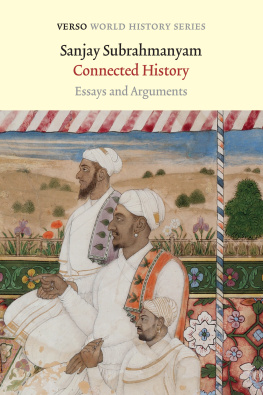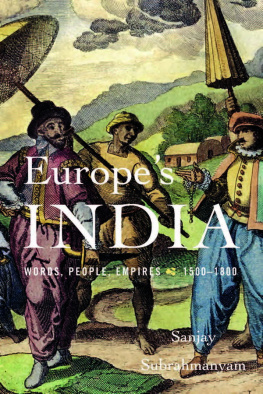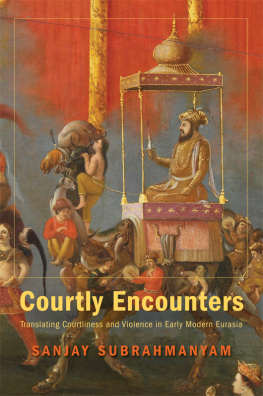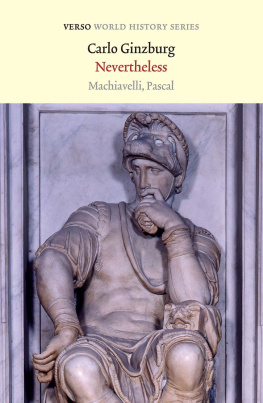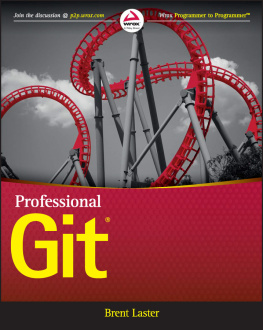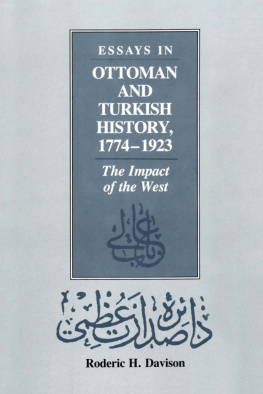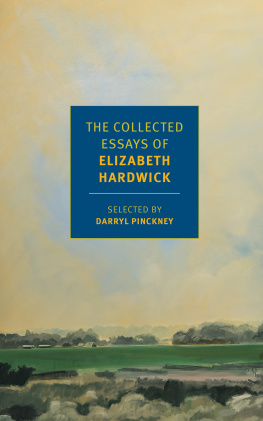Contents

CONNECTED HISTORY
Connected History
Essays and Arguments
SANJAY SUBRAHMANYAM

This expanded edition published by Verso 2022
First published in India as IsIndian Civilization
a Myth? by Permanent Black 2013
Sanjay Subrahmanyam 2013, 2022
Chapter 21 Sanjay Subrahmanyam 2012, 2022
All rights reserved
The moral rights of the author have been asserted
1 3 5 7 9 10 8 6 4 2
Verso
UK: 6 Meard Street, London W1F 0EG
US: 20 Jay Street, Suite 1010, Brooklyn, NY 11201
versobooks.com
Verso is the imprint of New Left Books
ISBN-13: 978-1-83976-238-3
ISBN-13: 978-1-83976-240-6 (US EBK)
ISBN-13: 978-1-83976-239-0 (UK EBK)
British Library Cataloguing in Publication Data
A catalogue record for this book is available from the British Library
Library of Congress Control Number:
2021947277
Printed and bound by CPI Group (UK) Ltd, Croydon, CR0 4YY
For
ANMOLE
Many wars are fought
across the mediocre
foxholes of the head
Contents
T hough my first professional publication as a historianon the fascinating subject of trade in the Kanara port of Basrur in the seventeenth centurydates to the end of 1984, I had already begun publishing journalistic pieces as an idle undergraduate in the late 1970s. A fair number of these were written for Trevor Drieberg, a genial Sri Lankan burgher and Marxist who lived in Nizamuddin West, which in those days was mostly a scattering of bungalows and old houses not far from the Jamunas west bank in New Delhi. Drieberg ran an information service called India Backgrounder and took what I delivered; other pieces were written for some of the less respectable Delhi magazines of the time (such as Probe India) which permitted freelancers; and I also wrote music reviews, of both rock and jazz, for the ephemeral midday newspapers of the time. Occasionally, I showed good sense in taking the precaution of using a pseudonym. Even if these pieces paid at most a few hundred rupeessometimes as little as fiftyit seemed a sizeable amount of money for that phase of my life, and allowed me to indulge in my favourite pastime of purchasing second-hand books and vinyl records, and even paid for some train journeys to visit friends in places like distant Kalimpong.
As I became serious about research, I abandoned other forms of writing through most of the 1980s. In the early 1990s, I again had the opportunity to publish in some of the Delhi newspapers, first the Economic Times and then the Times of India. This was largely because some of my former students from the Delhi School of Economics joined the editorial staff of those papers and kindly asked me to write for them. I am unable to trace most of those articles, which may be just as well, though I am secretly pleased to occasionally see one of them in particular, on the idea of the middle class in India, turn up even in scholarly citations. I continued to publish in the newspapers, as well as magazines such as India Today and Outlook (often book reviews) through the later 1990s and early 2000s, by which time I had moved from Delhi to Paris. Sometimes, I was even published on the same day and in the same paper as my father, K. Subrahmanyam, whose journalistic production, though on the very different subject of security and international relations, was rather prodigious compared to mine.
I would probably never have done anything with these lighter pieces had it not been for two facts. First, a couple of years after joining UCLA in 2004, I was approached by the London Review of Books to write for them and began to do so on rather diverse subjects once or twice a year. These were unusual pieces for me, long reflective essays around the books under review, frequently over 3000 words. After a few years, as often seems to happen with the LRB, my dealings with them ceased. However, as these pieces accumulated they came to the notice of Rukun Advani, who had been publishing my scholarly work since 1990 (when, as an editor in Oxford University Press, he accepted one of my early books, Improvising Empire). Rukun was astonished to find not only that I could write on topics that were not arcane and lost in the depths of time, but that, unlike some of the heavyweight scholarship which he claimed was his antidote to insomnia, he could read what I wrote without falling directly into the arms of Morpheus. He has been the principal motor behind putting together this collection and must therefore share at least some of the blame.
Unlike a large number of my contemporaries in Delhi University, I have never been tempted to write a novel or even publish a short story. Still, I do love literature, but am certain thatas in the best Hindi films, like Muqaddar ka Sikandarthis is unrequited love. It has been my privilege over the years, however, to have known some great writers and translators and to work with them. Amongst them I would number A.K. Ramanujan (whom I knew all too briefly, alas), but above all Velcheru Narayana Rao and David Shulman. They have always set an unfailing standard of taste and translation for me. I hope someday also to turn like them to the work of translation. (A historian, when he does his work, is anyway something of a translator.) For the moment, though, I hope the unfootnoted ideas and critiques here will meet some of their expectations.
My thanks to the many friends and colleagues who have commented on and criticized these pices doccasion. They are more than I can count. But thanks above all to Caroline Ford, who has always encouraged me by word and deed over the past decade in these offbeat pursuits.
The book is dedicated to an old friend, who in the late 1970s and early 1980s taught me more about literature, music, and aesthetics than either of us would care to remember.
Los Angeles
October 2012
The translation of the poem by Unamuno is new (not earlier published). Thanks to Anthony Pagden for help in its revision.
The chapters that comprise this book have all been revised for publication, the revision in some cases being heavy and yielding a substantially enlarged version of the one first published. The sources of first publication are listed below.
appeared in Outlook, 20 August 2001.
appeared in the Times Literary Supplement (London), 24 December 2010.
includes materials from an article in Outlook, 5 July 2004, and another article in the Telegraph (Kolkata), 8 August 2004.
appeared first in the London Review of Books (LRB), vol. 29, no. 18, 20 September 2007, pp. 2630.
appeared in the LRB, vol. 29, no. 21, 1 November 2007, pp. 79.
appeared in the LRB, vol. 30, no. 21, 6 November 2008, pp. 423.
appeared in the LRB, vol. 31, no. 23, 3 December 2009, pp. 2730.
appeared in the LRB, vol. 31, no. 3, 12 February 2009, pp. 289.
appeared in the LRB, vol. 31, no. 16, 27 August 2009, pp. 1921.
appeared in the LRB, vol. 32, no. 23, 2 December 2010, pp. 256.
was commissioned by the LRB in 2011, went as far as the proof stage, but then never appeared.
appeared in The Guardian (London), Saturday Review, 14 February 2009.
appeared in LHomme, nos. 1878, 2008, pp. 93104.
appeared (in French) in LHistoire, no. 355, JulyAugust 2010, pp. 706.
appeared in

